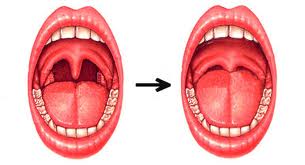Sleep apnea is a potential health risk for millions of Americans, and a new study points to a possible culprit behind the disorder: a “fat” tongue.
“This is the first study to show that fat deposits are increased in the tongue of obese patients with obstructive sleep apnea,” study senior author Dr. Richard Schwab, co-director of the Sleep Center at the University of Pennsylvania Medical Center, said in a news release from Sleep, which will publish the findings Oct. 1.
Sleep apnea is a common disorder in which the airways constrict during sleep, leading to repeated stops and starts in breathing. The telltale signs include chronic loud snoring, with periodic gasps or choking — and, for many people, daytime drowsiness because of poor sleep.
But the effects go beyond fatigue. Studies suggest those pauses in breathing stress the nervous system, boosting blood pressure and inflammation in the arteries.
Obese people tend to be at higher risk for sleep apnea, and Schwab’s team say the new findings may help explain the link between obesity and the breathing disorder.
The study included 90 obese adults with sleep apnea and 90 obese adults without the disorder.
The participants with sleep apnea had significantly larger tongues, tongue fat and percentage of tongue fat than those without sleep apnea, the researchers found. The tongue fat in the people with sleep apnea was concentrated at the base of the tongue.
 In addition to increasing the size of the tongue, higher levels of tongue fat may prevent muscles that attach the tongue to bone from positioning the tongue away from the airway during sleep, Schwab’s group explained.
In addition to increasing the size of the tongue, higher levels of tongue fat may prevent muscles that attach the tongue to bone from positioning the tongue away from the airway during sleep, Schwab’s group explained.
While the study found an association between tongue fat content and sleep apnea, it could not prove cause and effect.
However, the researchers believe future studies should assess whether removing tongue fat through weight loss, upper airway exercises or surgery could help treat sleep apnea.
“Tongue size is one of the physical features that should be evaluated by a physician when screening obese patients to determine their risk for obstructive sleep apnea,” American Academy of Sleep Medicine President Dr. Timothy Morgenthaler added in the news release.
“Effective identification and treatment of sleep apnea is essential to optimally manage other conditions associated with this chronic disease, including high blood pressure, heart disease, type 2 diabetes, stroke and depression,” he said.
Nearly 35 percent of U.S. adults — 78.6 million people — are obese, according to the U.S. Centers for Disease Control and Prevention.
Source: Detroit Free Press
The Presidential Healthcare Center now offers home sleep studies.

